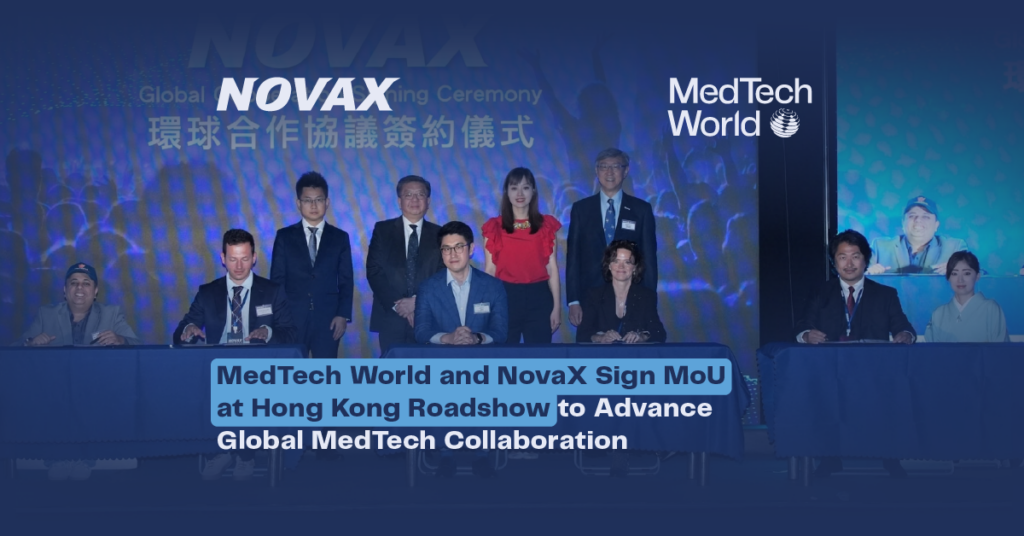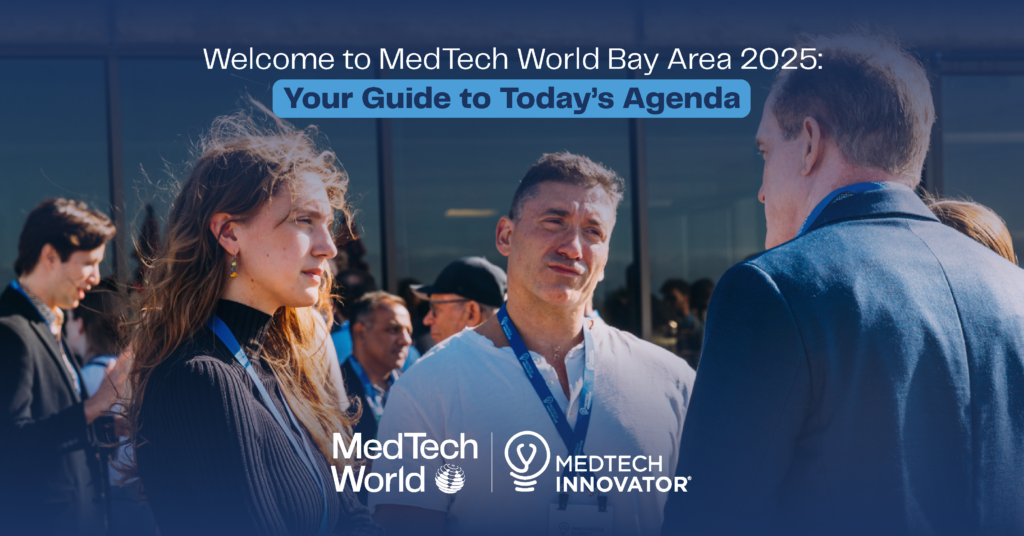
Michael Joe Cini
21st January 2022
[WATCH] Diagnosing a Success: From Med-Tech Startup to Global Powerhouse at Med-Tech 2021
The ever-expanding medical tech sector is the perfect launchpad for any ambitious start-up to rise to global prominence. In this Med-Tech 2021 panel, our three industry leaders help coach the next med-tech unicorns towards being the market makers of the near future
Speaking about the pitfalls enterprising med-tech startups might encounter in their rise to greatness, James Somauroo, the Founder and CEO of SOMX chaired a discussion between himself, Dr Simon J. Sonntag, CEO & Co-Founder at Virtonomy and Jasmin Hounsell, the CEO of Evolvene.
With Dr. Sonntag shepherding Virtonomy’s rise from the ground up and Hounsell spearheading Evolvene’s growth in the US market, the two have a wealth of experience in ensuring that a start-up survives in early stages and allows its potential to flourish.
Introducing herself, Hounsell is a marketer by trade who has personally led the expansion of several medical device firms in the United States and Asia whilst also establishing a few consortiums in the UK tasked with helping smaller companies to scale in a safe environment.
This was followed by Dr. Sonntag elaborated on his own background. As the developer of the first web-based SaaS that could be used by medical device developers, allowing them to use virtual patients and computer simulations to perform virtual clinical trials instead of the unethical option of using animals or the dangerous possibility of using human trial patients. The idea came to him during his PhD research in the field of computer aided medical engineering while also contributing to different medical societies and engaging in policy making to advocate for the adoption of silico-medicines. Soon enough, the start-up had passed the seed round with a significant amount of capital in investments and a growing team of 15 full-time employees.
Continuing on to the challenges he faced breaking ground with a brand new firm, Dr. Sonntag stated that manpower was a crucial initial step.
“One of the first tasks was to find a co-founder. Rather luckily, as I was looking at my network and then I found one person, my network knew someone else and this person knew someone else that was a perfect match. So we got in contact and we worked for a while and then I saw that we had really complimentary skills and also really thrived, because it’s very important really there that you also have to have the right mindset.”
Moving the conversation along, Somauroo mentioned that luck could be a crucial pillar for any start-up’s success. Reflecting on the statistic that 90 percent of start-ups fail, he also elaborated on his belief that any enterprising founder needs to create their own luck.
“It sounds like you weren’t just passively waiting for someone to come across your desk. You were out there getting people to introduce you, and you’ve got to put yourself in the right place at the right time.”
Agreeing with Somauroo, Dr. Sonntag stated that networking was crucial for the early success of a start-up as well as being able to relay and pitch the core idea openly and without hesitation.
“And the key thing for many, many early stage companies is getting the capital to actually execute on their ideas. So talk to me about that fundraising. How did you go about it? How did you approach that as a key challenge?”
Elaborating on the significantly unpleasant experience of having to fundraise during a global pandemic, Dr. Sonntag described the experience.
“So imagine you start your fundraising and then a one in 100 years pandemic suddenly appears. It’s something you can’t predict. So everything was cancelled. We couldn’t fly there [Rio]. Then also all the BCS and business angels said that they would rather want to secure their portfolio instead of investing in something new.”
He also shared the story of when one of his potential investors was arrested during a video call for shady business practices. The video does the story more justice than any text description ever would. He concluded that this enlightening experience happened to teach him that you shouldn’t open the champagne before the money is in the bank account since pretty much anything can happen.
Sharing her own story of start-up hardships, Hounsell’s experience with her own start-up was severely hampered by COVID-19. Having to conclude a round of funding on the exact same day that the United Kingdom went into full-lockdown due to the pandemic, Hounsell chaired a media roundtable on the announcement of their series B and their fundraising strategy. Thinking on her feet, Hounsell proposed that the launch be moved to Zoom to maintain the momentum they had been building up.
“I think we had ten of the big media outlets in the UK on trains going to this one place and we had to send everyone home. We had to do everything via zoom and, at the time, all of the people in the UK were like, we’ve never done anything with the media via zoom. How are you possibly going to do this? I’m like, it’s fine. It’ll work. Let’s go for it. And it did. And we got a lot of coverage.”
Drawing on Hounsell’s experience, Somauroo asked her to elaborate on how an enterprising start-up should scale given that she was at the head of one of the UK’s fastest growing companies.
“You don’t know what you don’t know, and you can’t underestimate the differences in a new market, especially in a market that speaks maybe the same language or something. You think maybe the barriers to entry are going to be lower, but they’re not. Even buying bedding in America was different.”
Given how every consumer base has different needs, tastes and habits, Hounsell stressed the fact that entry into a new market required a marketing plan to be tailor-made for the nuances of said target market. She also elaborated that feedback was as precious as gold in this process since the feedback could be used to create a more successful strategy each round.
“So actually, one of the things we did almost straight away when we got the product into America was literally go out and knock on doctor’s doors for like a couple of weeks. We would go down town, different cities, a couple of weeks, each city talking to them and seeing. What does [their] day look like? How many different things are [they] logging into? Is my product a pain for [them], or is it actually helping [them]? Is it giving you an actual login that [they] really don’t want? Um, do [they] understand the metrics that it’s reporting? Do [they] understand the wording, the terminology that we’re using?”
Dr. Sonntag chimed in that, while headquartered in Munich, he heavily prioritized the American market in terms of medical technology since it represents the largest global market in the context of the specific sector.
Moving onwards, Somauroo asked the two what mistake they see most often with Entrepreneuring start-ups.
Responding to Somauroo’s question on what these firms should focus on not doing, Hounsell stated that they shouldn’t assume that they can do it alone or from afar. “In my opinion [the main mistake these firms make], and I’m biased because I’m a marketer by trade, is not getting their marketers involved early enough.” She suggested that the firm use their marketers as intelligence agents and points of contact between their consumer base and themselves, allowing them to craft the perfect strategy and the perfect product for a specific market.
To conclude, Somauroo asked the two what challenges they see in the near future for their firms, how they plan to tackle them and what advice they would give to their younger selves.
Dr. Sonntag mentioned that, financially, startups like Virtonomy always have to contend with established and entrenched firms with much deeper pockets. The ability to hire good talent that wouldn’t be poached by better funded and older firms is a constant risk for firms finding their feet in a new market and presents a massive threat to a nascent start-up ecosystem.
Hounsell finished by stressing the need for firms to stay close to their consumer base.
“I was part of the health system myself. I received care. So I knew [the American healthcare system] as well as I knew the NHS say in the UK. So I think one of the big things I would give myself or anyone starting out, that’s trying to commercialize or help a company commercialize, it’s just spend most of your time speaking to your customers. Like they are the most important thing you should be doing. You shouldn’t be sitting in like an ivory tower strategizing by yourself. You really need to go out and actually just speak to the people. It’s more fun that way, but also you learn just so much.”
For more panels on the emerging field of medical technology, click here.
About Med-Tech World:
It is now estimated that the global digital health market will increase to around $640 billion by 2026. Through our expertise coupled with optimized networking, we will ensure that both investors and startups are on the ground floor of this health revolution. The event which is organized and curated alongside a team of doctors, attracts legislators and policymakers, medical professionals, and investors from across the world, addresses the opportunities and challenges driving this million-dollar forum.




